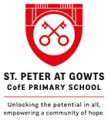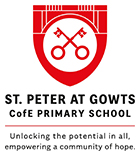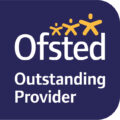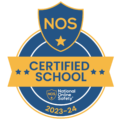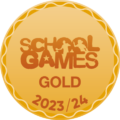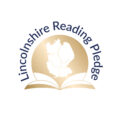Maths
Maths intent statement:
At St Peter at Gowts, our maths curriculum is inspiring and creative unlocking potential in all. Our curriculum seeks to ensure that all pupils flourish through challenge, support and a broad and balanced curriculum rooted in shared values and consistently high expectations while striving for excellence.
St Peter’s maths curriculum is fashioned through our golden threads of values, inspiration, excellence and community.
As a mathematician, we begin to see that the diverse nature of maths is all around us and is an ess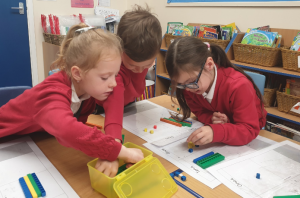 ential part of everyday life, whether we realise it or not! Not a day goes past without the need to use maths skills, whether it be estimating how long it takes to get to school or how far your pocket money will go at the shop or whether the distance you have thrown a javelin beats the school record! Therefore, mathematics forms an essential part of our ambitious broad and balanced curriculum where we endeavour to ensure that children develop an enjoyment and intrigue for maths as well as resilience when faced with a challenge, that will inspire them through their maths learning journey. We believe that unlocking mathematical fluency is an essential life skill for all learners in our school community and is a pre-requisite to being able to reason and solve problems mathematically, our cohesively planned curriculum aims to deliver this. Our aim is to develop a positive culture of deep understanding, confidence and competence in maths that produces strong, secure mathematical knowledge and skills. As a school, we recognise that the key to unlocking the potential in our children is through the development of basic mathematical skills and the understanding and recall of times tables which therefore forms the fundamentals of our maths curriculum to enable all children to strive to achieve excellence.
ential part of everyday life, whether we realise it or not! Not a day goes past without the need to use maths skills, whether it be estimating how long it takes to get to school or how far your pocket money will go at the shop or whether the distance you have thrown a javelin beats the school record! Therefore, mathematics forms an essential part of our ambitious broad and balanced curriculum where we endeavour to ensure that children develop an enjoyment and intrigue for maths as well as resilience when faced with a challenge, that will inspire them through their maths learning journey. We believe that unlocking mathematical fluency is an essential life skill for all learners in our school community and is a pre-requisite to being able to reason and solve problems mathematically, our cohesively planned curriculum aims to deliver this. Our aim is to develop a positive culture of deep understanding, confidence and competence in maths that produces strong, secure mathematical knowledge and skills. As a school, we recognise that the key to unlocking the potential in our children is through the development of basic mathematical skills and the understanding and recall of times tables which therefore forms the fundamentals of our maths curriculum to enable all children to strive to achieve excellence.
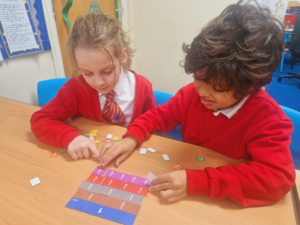
Our four key threads weave through everything we do at St Peter’s :
Values – Our maths curriculum embraces our school and British values through developing the ability to reason and problem-solve, both transferrable skills across the curriculum. Children work together, listening and sharing ideas, learning how to agree or disagree over points of view, justifying their mathematical reasons in a mature and tolerant manner. Through family learning, values and attitudes of parents and carers towards maths are enriched through family learning opportunities.
Inspirational – Our inspiring maths curriculum is cohesively constructed to unlock children’s mathematical potential and build key mathematical skills, as well as those of fluency, reasoning and problem-solving which can be applied in real-life experiences throughout life.
Excellence- Our cohesively planned maths curriculum allows all children to achieve and continue their ever developing journey as a mathematician learning transferrable skills to be used throughout life.
Community – Throughout our maths curriculum, children will develop their understanding of how maths is used in our everyday lives in our local community. Opportunities are offered in school to support members of the community who may have less favourable experiences of maths in their own schooling, through family learning opportunities.
Maths implementation:
Our Maths curriculum provides breadth, balance and depth, is relevant and engaging and is adapted to match the needs and abilities of all our children to ensure that all children are able to excel. As a school, we believe in the importance of following the concrete-pictorial-approach as a means to developing a solid understanding of mathematical concepts which can be applied in a variety of contexts through reasoning and problem-solving challenges.
- Maths is delivered daily across school from EYFS to Year 6 either in the form of CLIC and / or a discrete maths lesson.
- Fro
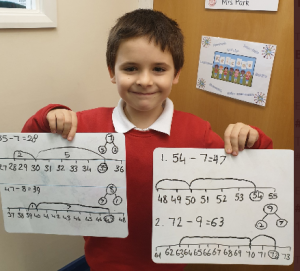 m Nursery to Year 6, all classes use ‘CLIC’ as a basis for consistently developing fundamental maths skills on a daily basis. CLIC follows a ‘small step progress drive’ format identifying each little step in knowledge and skills required to be competent in basic maths.
m Nursery to Year 6, all classes use ‘CLIC’ as a basis for consistently developing fundamental maths skills on a daily basis. CLIC follows a ‘small step progress drive’ format identifying each little step in knowledge and skills required to be competent in basic maths. - In EYFS, children follow the small step principles of ‘White Rose Maths’ which build up to transport children on their ‘journey to mastery’ learning the fundamentals behind the meanings of numbers and exploring other key mathematical areas, including shape and measurement.
- In Years 1 to 6, children are taught through ‘Power Maths White Rose Edition’ which complements the early learning of our EYFS children. Power Maths is designed to spark curiosity and excitement and help nurture confidence in maths and is a recommended high-quality textbook which has been judged as ‘fully delivering a mastery approach’. Year 6 follow Power Maths but adaptations are made as necessary to ensure full and timely coverage ready for the secondary transition.
- Power Maths uses ‘small steps’ to break down the teaching sequence into small achievable steps. Where children require additional support, ‘scaffolds’ are used to support children further to ensure that they have secured the small step before moving on. For children who understand a concept quicker, ‘stretch’ challenges are used to deepen and challenge learners further within the curriculum area. Progression documents are carefully used to ensure that children are not being stretched outside their year group but rather deepened within it.
- Daily assessment is incorporated throughout the ‘Power Maths’ lesson through live and verbal feedback. Where children require additional support, ‘learning surgeries’ are used to support children ensuring that they are ready for the next ‘small step’. Through the use of pre-assessments, children may be identified who would benefit from ‘pre-teaching’ of upcoming concepts to ensure they are ready to access the learning successfully. Termly assessments are used as a diagnostic tool to ensure that teachers are adapting learning to meet the needs of all children and ensure that any necessary interventions are targeted specifically to meet the needs of children.
- Maths is used across the curriculum as a method of embedding current skills as well as showing the purpose of why we need maths in everyday life.
- Times tables also play an important part in our daily maths learning, with children developing their fluency in rapid recall of tables up to 12 x 12 by the end of year 4 through both CLIC and Power Maths lessons. While the rapid recall of times tables is being developed, children are also learning how to apply and manipulate their understanding of this to reason and solve problems.
- To inspire the next generation of mathematicians, local and wider career opportunities are celebrated and explored throughout school.
Maths impact:
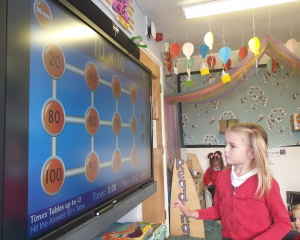
By the end of Year 6, transitioning to secondary school, we aspire that a St Peter’s mathematician will have developed a bank of efficient and accurate skills that can be used to calculate effectively. These will have been underpinned by the C-P-A process so children understand rather than just do, which ultimately will allow children to identify when answers do not make mathematical sense. Children will be able to apply these calculation skills and understanding of other areas to become confident and resilient problem-solvers with the ability to reason and articulate their ideas mathematically.
